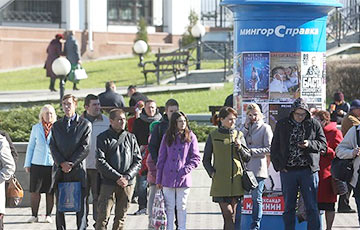What Hides Behind the Census?
- 21.10.2019, 15:39
- 3,379

The information received about the Belarusians will be publicly available.
Belarus holds census from October 4 to 30.
People have already resented of questions asked and stated that they would turn census takers from the door.
How much is such a "census" correct concerning the rights and freedoms of citizens? How can one prevent state interference form one's private life?
Former judge of the Constitutional Court of Belarus, Doctor of Legal Sciences, Professor Mikhail Pastukhou, answers questions of Charter97.org.
- Many of our readers are outraged by the authorities' attempts to learn about the sources of their income, plans to travel abroad and personal information (plans on the number of children, etc.). Do these questions violate personal rights and financial secrets of citizens?
- I believe that in this case some questions go beyond the scope of the census and invade the sphere of citizens' rights and freedoms ensured by the Constitution. Including the issue of family life. There is an invasion of citizens' homes.
Generally speaking, the census is an event of national importance, citizens should participate in it because it is practiced by most countries. From time to time the state wants to get some information about its citizens. Therefore, there's no ground to say that the decision to carry it out is illegal or unconstitutional.
But the Belarusian government ask 49 questions and some of them fall into the sphere of personal and family interests, violating it. This fact requires recognition. Such questions should not be included in the list. But the fact remains. The Council of Ministers adopted them.
- Recently, the tax authorities were interested in Belarusians who own more than one apartment. And the Deputy Minister of Labour and Social Protection said that the database of "parasites" involved more than 50 sources. Is it possible that the answers from the census will get to the fiscal and other authorities and will be used against our citizens?
- It can happen. The results of the census will be publicly available on the Internet. All the interested state bodies, including the tax inspectorate, will have access to this information.
All those who work abroad, who have a lot of property, including houses, cottages may come to the attention of them. It can be assumed that the census can be used by the authorities to achieve their "objectives".
- Belarus refused to accede to the Council of Europe and Convention No. 108, which guaranteed the protection of personal data. The authorities use it to get out of scandalous cases - as, for example, when the embassy of our country in Poland "leaked" hundreds of e-mails of Belarusians into the network and just apologized for it. Can we say that providing personal data to the state is a risk for a Belarusian and there are no guarantees of their correct use?
- Yes. It should be said that many legal documents provide for the possibility of obtaining personal data about citizens without their consent. This also applies to the database of "parasites". Here the authorities violate the constitutional right to protection of private and family life!
It should also be noted that the Republic of Belarus is the only country in Europe that is not a member of the Council of Europe. It means that all directives, conventions, and acts adopted within the framework of the Council of Europe, including those on the unconditional abolition of the death penalty, are not binding for our country. Although they do not oblige Belarus to anything, they can show what European standards should be aspired to.
- The Constitution provides for the right of citizens not to testify against themselves. Is it possible to consider this census as an interrogation?
- To some extent, it is. The right of a citizen not to testify against himself or herself and close relatives falls within the criminal and administrative process. It is not about any accusations or suspicions - it is just information for the resolution of some state issues. That is, this right is affected very indirectly in this matter, so it is doubtful that a direct violation of the right takes place.
A citizen may give such information or may refuse to fill in the list. I would like to stress once again that a citizen is free in answering - no one obliges to give such information! Including information about income, the number of apartments, homestead lands and other things.
But the authorities, studying this information, can make tags. For example, if a person refuses to talk about the sources of income - it means that the tax authorities may start an investigation.
- What could you say about the situation of state employees - teachers, students and others - who were sent to carry out a census? They often face a negative reaction of people. Can they refuse to do it saying that this activity poses a threat to at least their health?
- Students and teachers may refuse to carry out the census. But they should be aware that some moral and perhaps even disciplinary measures may be applied. As they were passive towards "public duties".
It does not bear any administrative, criminal or civil liability for such refusal! But the administration can make appropriate conclusions: for example, not to issue a bonus, etc.
Practice shows that the administration tries to somehow compensate for this "public work" by allocating additional bonuses. Students may miss classes for a good reason.
There are elements of coercion. But citizens can also refuse from these duties.











